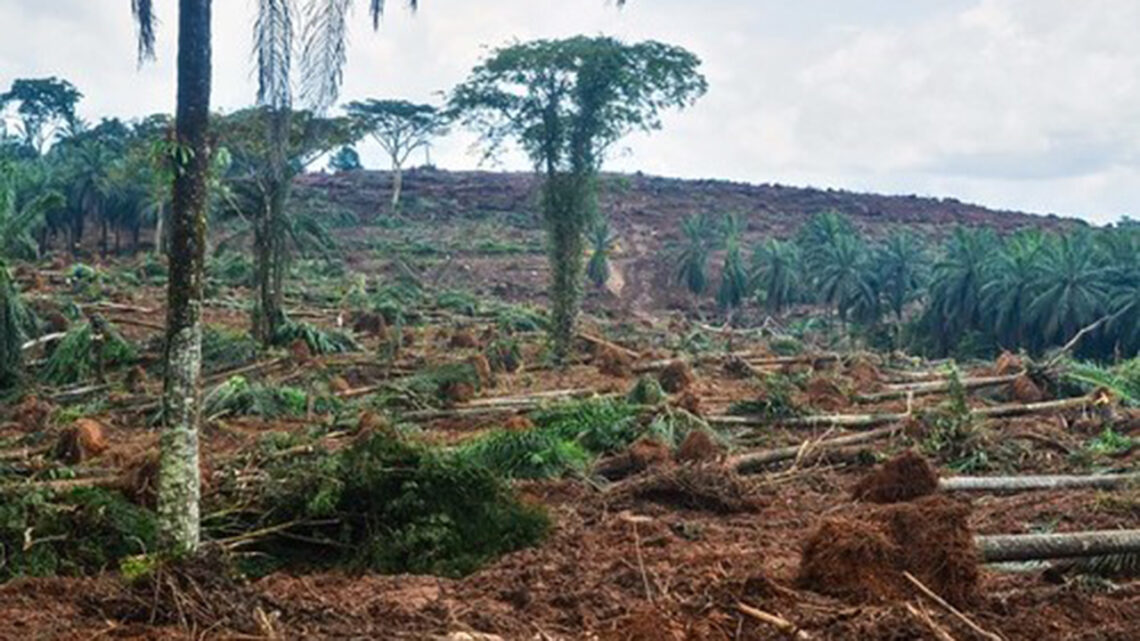In the global agricultural space, Nigeria faced significant environmental challenges, with deforestation becoming widespread and one of the most pressing issues.
Deforestation not only threatens the country’s biodiversity but also leads to severe soil degradation, jeopardizing agricultural productivity and food security drive.
A healthy environment devoid of such challenges remains imperative to achieve a global agenda for food security and preserving soil fertility through reforestation and sustainable land use practices is essential for the nation’s future.
Deforestation is usually driven by illegal logging, agricultural expansion, and urbanisation and is accelerating soil degradation in Nigeria.
No gainsaying that forests play a critical role in maintaining the fertility of the soil by stabilising the ground, regulating water cycles, and preventing soil erosion. When trees are felled, the protective forest cover disappears, exposing the soil to intense weather conditions such as heavy rainfall and strong winds.
This leads to soil erosion, the loss of vital nutrients, and a significant reduction in crop yields, as seen in many parts of the country, including the northern states, which are grappling with desertification.
In Nigeria, soil fertility has been declining at an alarming rate. Research indicates that the country is losing nutrients at an average of 48 kg per hectare per year, with nitrogen, phosphorus, and potassium being the key nutrients depleted from the soil.
This depletion is largely attributed to poor land management, deforestation, and over-cultivation. As a result, farmlands become less productive, leading to food insecurity, particularly in regions that rely heavily on subsistence farming.
One of the key drivers of deforestation in Nigeria is the use of wood as a primary source of energy, particularly in rural areas. To address this, environmental advocates have called for the promotion of cleaner energy sources, such as solar and biogas, which would reduce the dependency on wood. The government’s role in providing affordable and accessible alternative energy sources is crucial in this regard. By transitioning to cleaner energy, the rate of deforestation can be significantly reduced, allowing forests to regenerate and soils to recover.
In addition to energy solutions, sustainable farming practices must be promoted to preserve soil fertility. Agroforestry, a land-use system that integrates trees into agricultural landscapes, offers a sustainable solution to both deforestation and soil degradation. By incorporating trees into farming systems, farmers can improve soil fertility, reduce erosion, and increase biodiversity. This approach not only enhances food security but also provides farmers with additional sources of income, such as fruit and timber
Similarly, In an effort to combat deforestation and safeguard Nigeria’s agricultural future, the federal government has inaugurated the National Task Force (NTF) on European Union Deforestation Regulation (EUDR).
The move came as part of Nigeria’s commitment to aligning with EU requirements to curb deforestation linked to the trade of key agricultural commodities such as cocoa, timber, and rubber.
The EU Deforestation Regulation, which took effect in June 2023, mandates that commodities exported to the EU must be free from deforestation or forest degradation after December 2020.
This policy has significant implications for Nigeria’s non-oil exports, particularly its cocoa, rubber, and timber industries, which collectively represent over 80 per cent of the country’s annual €523 million non-oil trade with the EU.
While inaugurating the task force in Abuja, minister of agriculture and food security, Abubakar Kyari, stressed the urgency of ensuring compliance, noting that a failure to meet the December 2024 deadline could result in a ban on Nigerian products in the EU market.
“The loss of this market poses a serious threat not just to the agricultural sector but to the national economy.
“Millions of farmers and value chain operators rely on these exports for their livelihoods, and the potential drop in foreign exchange would exacerbate the Naira’s already deteriorating exchange rate,” he said.
Kyari emphasised the need for a united effort from all stakeholders to meet the EU’s stringent requirements. The newly-formed NTF will play a critical role in this process, coordinating efforts across ministries, research bodies, private sector actors, and international partners.
The minister highlighted the importance of updating forest mapping data, which has not been revised since 1959, and implementing a national traceability system for agricultural products.
The task force will also explore opportunities for funding from the EU to support these initiatives. With neighboring Ghana already making significant strides in tracking cocoa farms, Nigeria must not lag behind, Kyari warned.
“We are determined to ensure compliance with the EUDR, and we are also exploring alternative markets such as China and Russia to diversify our exports,” he added.
In light of the challenges posed by the EUDR, there have been calls from international bodies, including the World Trade Organization, for a postponement of the regulation’s deadline due to the bureaucratic burden it places on exporting countries.
The minister echoed these concerns, joining the International Cocoa Organization (ICCO) in advocating for a two-year extension.
Despite the hurdles, Kyari expressed confidence in Nigeria’s ability to meet the deadline, provided the Task Force works efficiently and in unison. He urged members to focus on creating a comprehensive national strategy for forest conservation, product traceability, and sustainability across the agricultural value chain.
As Nigeria moves forward with these initiatives, the focus on deforestation as a critical environmental issue underscores the broader goal of preserving soil fertility and mitigating the impacts of climate change.
The successful implementation of the EUDR will not only protect Nigeria’s forests but also secure the future of its agricultural sector and the millions of livelihoods it supports.
Addressing deforestation in Nigeria is critical for preserving soil fertility and ensuring the long-term sustainability of agriculture. Reforestation efforts, combined with the promotion of alternative energy sources and sustainable farming practices, can help reverse the damage caused by decades of deforestation.





